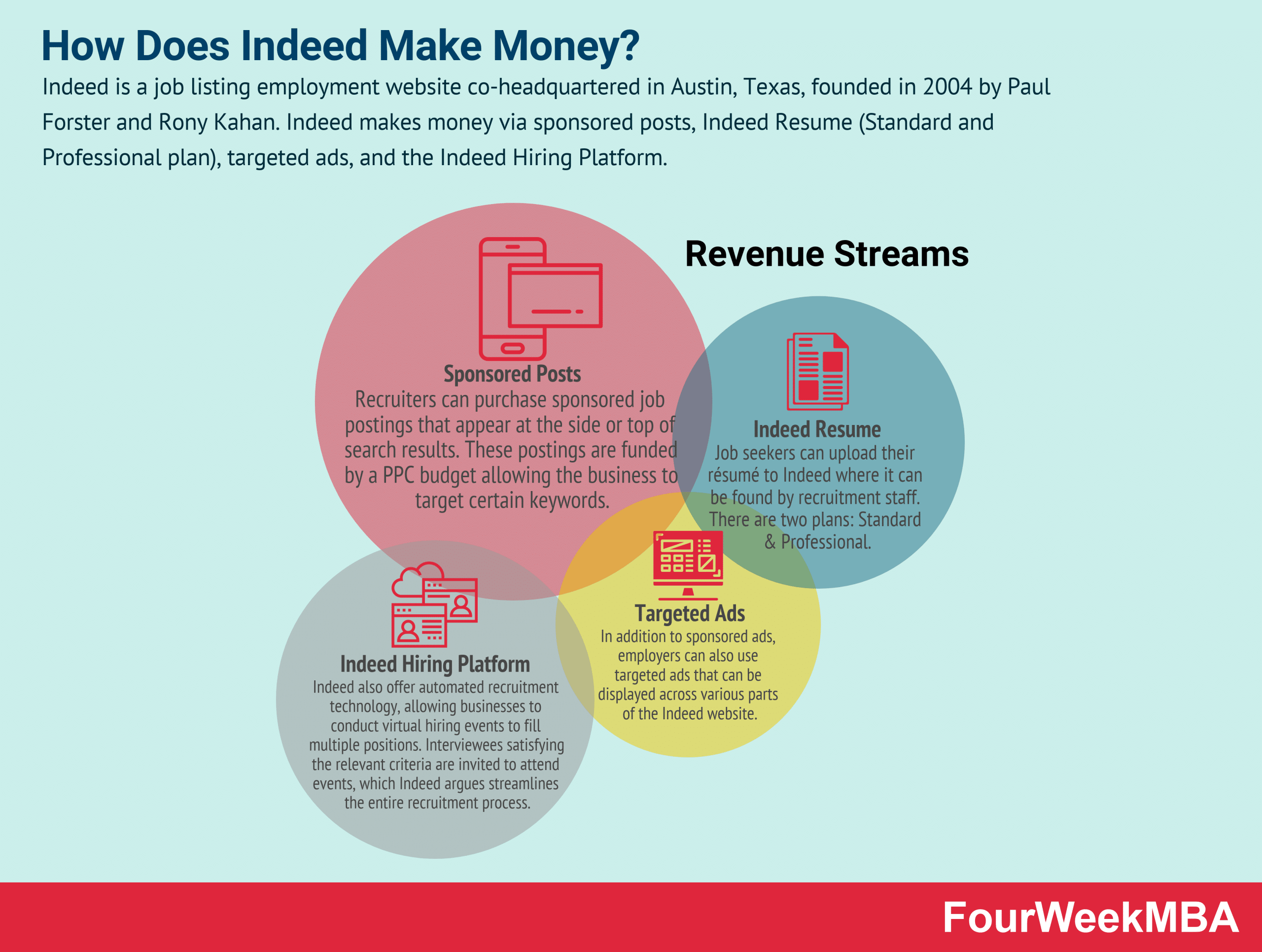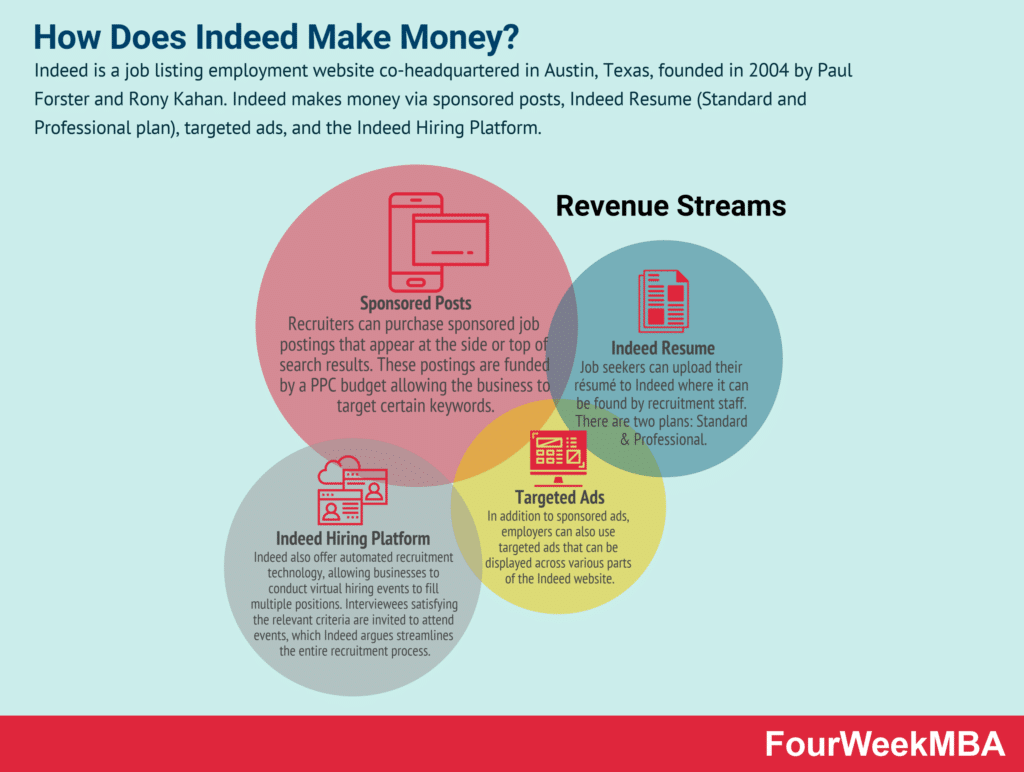Ever wondered how Indeed, the popular job search platform, makes money? Well, let’s dive right in and uncover the secrets behind their business model.
So, how does Indeed make money? It’s quite fascinating! Indeed generates revenue through paid job postings by employers who are looking to fill their vacancies. These employers pay to have their job listings featured prominently on the website, ensuring visibility to a vast audience of job seekers.
But that’s not all! Indeed also offers additional advertising solutions such as sponsored job ads and display advertising. These options allow businesses to further enhance their recruitment efforts and reach a targeted audience, ultimately giving Indeed a steady stream of income.
In a nutshell, Indeed’s primary source of revenue comes from employers who pay for enhanced visibility and advertising options on the platform. By providing these services, Indeed maintains its status as a go-to resource for job seekers while simultaneously ensuring a lucrative income stream. Fascinating, isn’t it? Let’s explore more about Indeed’s success story!
Indeed makes money through a pay-per-click advertising model. They charge employers when their job postings get clicked by job seekers. Moreover, they offer additional services like sponsored job listings and resume database access, which come at a cost. As the leading job search engine, Indeed’s vast user base and effective targeting options make it an attractive platform for companies to promote their job openings and reach qualified candidates.

How Does Indeed Make Money?
In today’s digital age, job search platforms have become a crucial resource for both job seekers and employers. Among these platforms, Indeed stands out as one of the most popular and widely used websites, connecting millions of job seekers with employment opportunities worldwide. But have you ever wondered how Indeed makes money? In this article, we will delve into the various revenue streams that contribute to Indeed’s success and explore the strategies behind its profitability.
Pay-Per-Click Advertising
One of the primary ways Indeed generates revenue is through pay-per-click (PPC) advertising. Employers who post job listings on Indeed can choose to boost their visibility by running PPC campaigns. This means that when a job seeker clicks on one of these sponsored listings, the employer pays a predetermined fee to Indeed. The more competitive the job market, the higher the cost-per-click tends to be, as companies strive to attract qualified candidates. This revenue stream allows Indeed to cater to both large corporations and small businesses, offering them various advertising packages to suit their specific needs and budgets.
Moreover, Indeed also provides employers with advanced targeting options, allowing them to reach their desired audience based on criteria such as location, industry, and job level. By providing robust advertising solutions, Indeed helps employers maximize their visibility and find suitable candidates efficiently. The success of this revenue stream is evident in Indeed’s continued growth and financial stability.
Sponsorship and Enhanced Company Profiles
Another significant source of revenue for Indeed comes from sponsorships and enhanced company profiles. Companies have the option to upgrade their basic company profiles on Indeed to gain more visibility and attract top talent. Enhanced profiles allow employers to showcase their company culture, highlight employee reviews, and provide additional information about their organization. These features contribute to a positive employer brand image and help companies differentiate themselves in a competitive job market.
Indeed also offers sponsored content opportunities, allowing companies to promote their brand and job openings on targeted pages within the platform. By leveraging these sponsorship options, businesses can increase their visibility among relevant job seekers and improve their chances of attracting qualified candidates. These revenue-generating features demonstrate Indeed’s commitment to providing comprehensive solutions to both job seekers and employers, making it a go-to platform for all things related to jobs and careers.
Data Licensing and Partnerships
In addition to its advertising services, Indeed generates revenue through data licensing and partnerships. With its extensive database of job listings, employer profiles, and user information, Indeed possesses valuable insights into the job market. This data can be incredibly valuable to recruiters, HR professionals, and other industry stakeholders who are looking for market trends, salary information, or talent acquisition strategies.
By licensing its data to third-party applications and partners, Indeed creates a win-win situation. These collaborations allow partner platforms to provide their users with up-to-date job market information while providing Indeed with an additional revenue stream. The data licensing and partnerships model not only brings financial benefits to Indeed but also enhances its reputation as a leader in the job search industry.
Job Seeker Services
While the majority of Indeed’s revenue comes from employers and advertisers, the platform also offers certain services to job seekers for a fee. Indeed provides optional services such as Resume Writing, Resume Review, and Resume Spotlight. Job seekers can choose to invest in these services to enhance their profiles, increase their visibility to employers, and improve their chances of landing an interview.
By offering these services, Indeed caters to job seekers who may be seeking an extra edge in a competitive job market. While these services may not be a significant revenue stream compared to advertising and data licensing, they add value to the overall user experience and contribute to Indeed’s profitability.
Job Seeker Subscription Plans
To provide even more value to job seekers, Indeed offers subscription plans that give users access to exclusive features and benefits. Job seekers can upgrade to Indeed’s subscription plans, such as Indeed Prime or Indeed Resume, to gain advantages like advanced search filters, messaging capabilities, and priority placement in employer search results.
These subscription plans provide a recurring revenue stream for Indeed. Job seekers who value the additional features and benefits are willing to pay a monthly fee to gain a competitive edge in their job search. The subscription plans not only generate revenue for Indeed but also foster a sense of loyalty among users who appreciate the added value and continue to utilize the platform for their job-seeking needs.
Marketplace and Added Services
Indeed has also ventured into the marketplace space, offering added services beyond traditional job search capabilities. The platform has introduced services such as Indeed Hire, which enables employers to connect with staffing agencies and hire pre-vetted candidates. Additionally, Indeed also operates Indeed Assessments, providing employers with skill tests to evaluate candidates’ abilities.
These added services not only benefit employers by streamlining the hiring process but also generate additional revenue for Indeed. By diversifying its offerings and expanding beyond job listings, Indeed has positioned itself as a comprehensive recruitment solution provider, catering to the evolving needs of the job market and maximizing its revenue potential.
Indeed’s Success in the Job Search Industry
Market Share and User Base Growth
Continued Innovation and User Experience
Key Takeaways: How Does Indeed Make Money?
- Indeed makes money through job advertising, where employers pay to have their job listings shown to job seekers.
- They offer various advertising solutions, such as sponsored job listings and pay-per-click job ads, to generate revenue.
- Indeed also has a pay-per-applicant model, where employers pay only when someone applies to their job posting.
- Additionally, the company earns income through resume database access for recruiters and job distribution services.
- Indeed’s business model relies on connecting job seekers with employers and providing them with efficient recruitment solutions.
Frequently Asked Questions
Below, you’ll find answers to some of the most commonly asked questions about how Indeed makes money.
1. How does Indeed generate revenue?
Indeed generates revenue primarily through employers who pay to advertise their job openings through job postings and sponsored job ads. These ads are displayed to job seekers who use Indeed’s platform to search for opportunities. Employers can set specific budgets for their advertising campaigns, and they are charged based on the number of applications they receive or the number of clicks their ads generate. This pay-per-click or pay-per-application model allows Indeed to monetize its platform.
In addition to job postings, Indeed also offers additional services to employers, such as resume database access, featured employer profiles, and pay-per-click advertising on its partner network of websites. These additional offerings provide additional revenue streams for the company.
2. How does Indeed’s pay-per-click advertising work?
Indeed’s pay-per-click (PPC) advertising allows employers to bid on specific keywords or phrases related to their job posting or industry. When job seekers search for those keywords, the employer’s ads are displayed at the top or side of the search results page. Employers are charged each time a user clicks on their ad. The cost per click (CPC) varies based on factors such as competition for the keywords, industry, and location. PPC advertising helps employers reach a targeted audience and drive traffic to their job listings.
Indeed provides tools and analytics to help employers optimize their PPC campaigns. These tools allow employers to track the performance of their ads, monitor their budget, and make data-driven decisions to improve their ROI (Return on Investment).
3. Can job seekers use Indeed for free?
Yes, job seekers can use Indeed for free. Indeed’s primary focus is to connect job seekers with employment opportunities, and they provide their platform as a free service. Job seekers can create profiles, upload resumes, search for jobs, and apply to job postings without any cost. However, they may come across sponsored job ads displayed alongside organic search results, which are paid advertisements from employers.
Indeed also offers optional paid features for job seekers, such as resume writing services or priority placement for their applications. These premium services offer additional benefits for job seekers who want to enhance their job search experience, but they are not necessary to use the platform for free.
4. What is Indeed’s affiliate marketing program?
Indeed’s affiliate marketing program allows third-party websites, blogs, or online communities to earn a commission by referring job seekers or employers to Indeed. Affiliate partners can place Indeed banners, widgets, or links on their websites, and they earn a commission whenever a job seeker or employer clicks on the affiliate link and performs a qualifying action, such as creating an account, posting a job, or applying for a job. The commission is typically based on a percentage of the advertising spend or the value of the action performed.
The affiliate marketing program helps Indeed expand its reach and attract more users to its platform by leveraging the audience and traffic of its affiliate partners. It’s a win-win partnership where affiliates earn income while helping job seekers and employers connect through Indeed.
5. Are there any other revenue streams for Indeed?
Yes, in addition to job postings, PPC advertising, and affiliate marketing, Indeed has diversified its revenue streams. The company offers premium subscription packages for employers, such as Indeed Resume subscriptions, which provide access to a database of resumes for talent sourcing purposes. Employers can pay a monthly fee to access the database and search for potential candidates based on specific criteria.
Indeed also provides recruitment advertising solutions for enterprise-level clients and partners with recruitment agencies and other job boards to expand its reach. These partnerships and premium services contribute to Indeed’s overall revenue and help them serve a wider range of employers and job seekers.
The Advanced Guide to How Does Indeed Work & Make Money
Summary
So, here’s what you need to know about how Indeed makes money. First, they charge employers to post job listings on their platform, which helps them cover their costs. Second, they offer employers the option to promote their job listings and reach a wider audience, which generates additional revenue. Overall, Indeed’s business model revolves around connecting employers with job seekers and providing valuable services to both parties in the process.

